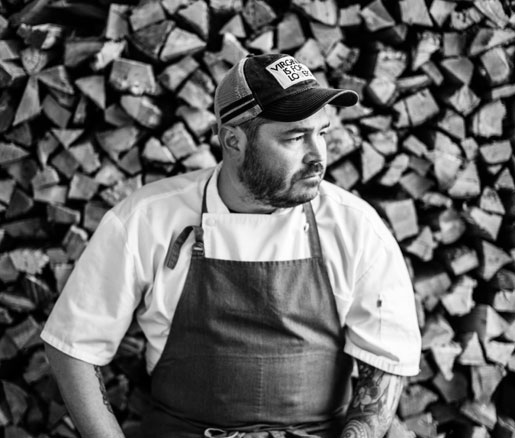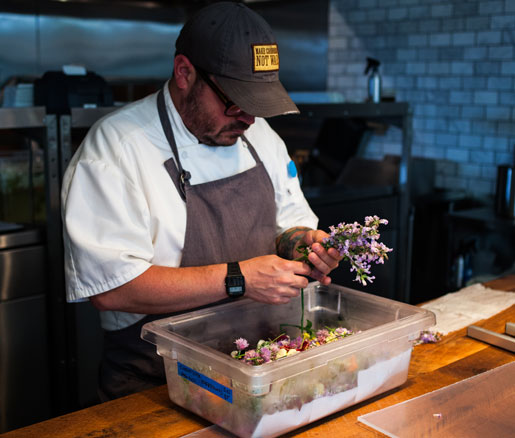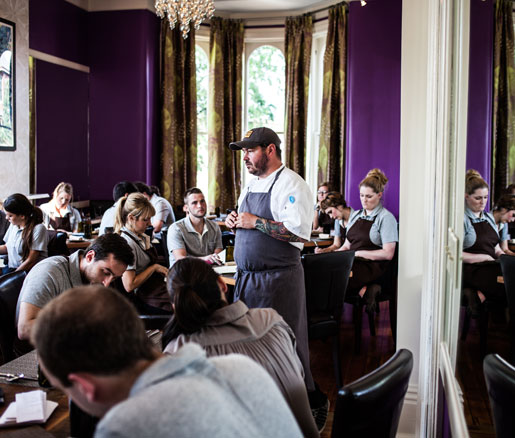
For the second year in a row, the well-rounded Sean Brock, whose obsessions stretch from fine-tuning burgers and fried chicken to resurrecting heirloom seeds and studying Senegalese cookery, is nominated for the JBF Award for Outstanding Chef. Below, Brock tells us about his sprawling cookbook, an upcoming Charleston concept, and much more.
--
JBF: Let's start with a subject that's near and dear to your heart: burgers. You do such an admired one at Husk. What are some other chef-driven burgers that have you have tried and really loved?
SB: For me, burgers are an enormous passion. But anything that's an icon like that is going to result in some really bad versions of it. For every ten bad ones, there's a half-good one. People try to do too much to it. You have to keep it simple. So, my favorite burgers? The one at Au Cheval in Chicago—holy cow. I would get on a plane for a burger. As a chef, I’m in the kitchen all day and I’m tasting all the time, so it’s unusual for me to eat things like whole burgers or other big meals. But I ordered that burger, ate it, and then ordered a second. I never do that. And then there’s the Holeman & Finch burger. I just had that one last week. These burgers do the simple things well: it's about the age, cut, and grind of the meat. How long the bun has been out of the oven. How crappy the American cheese is.
JBF: Let's move on to your latest project: the Workshop Series at the Stables at Husk Nashville, where you host guest chefs from around the country and collaborate on tasting menus. Your first guest chef was Joseph Lenn from Blackberry Farm. How did it go? Who are you working with next?
SB: The Workshop isn’t just about spotlighting a celebrity chef. I really want it to be a place where you can learn and experience unique things that you wouldn't experience in a typical restaurant setting. I wanted to do something that was stimulating for me and, hopefully, stimulating for the public, too. The focus of the first event was beermaking. We had Sam Beall come down and give people a taste of their beer, which is usually only available at Blackberry Farm. Their saison is one the best beers I've ever had. For food, we did outrageously delicious fried chicken. We had a blast.
The next event will showcase what I really want this project to be: a platform for a specific subject and exploring it through more than just food. With music, performances, even film. I want to use the Workshop as a center for studying a culture. We’re going to an event about the Gullah/Geechee food of the Lowcountry, and its links to Senegal and West Africa. Even though it's all around us here, I think a lot of people don't understand the extent of those influences on our culture. One guy here in Charleston, B.J. Dennis, is a classically trained chef who decided to step out of the kitchen and chase the cuisine of his grandparents. He's really the only person I know who is doing that kind of food, which is great because we need to tell people how special it is. It's the only way to preserve it and stop it from dwindling. So, for the event, I will speak about my trips to Senegal, my work with Glenn Roberts, and my work with the University of South Carolina. There will be a Gullah prayer, some Gullah music, we’ll watch a cool film about the Gullah culture. I will do three dishes, and B.J. will do three dishes.

JBF: We know you're a big cookbook collector. What are some of your favorite cookbooks that you find yourself returning to again and again?
SB: I like books with a lot of writing in them. They’re about more than just the perfect cornbread or red rice recipe. I want a book that explains why we have something in particular cooking in the skillet. One of John T. Edge's first books, A Gracious Plenty, is a classic. The first 15 pages are some of the most amazing writing you will ever read. John Egerton's Southern Food caught my attention when I was 19. I had the pleasure of meeting him and cooking for him a few times before he passed away. Ronni Lundy’s Shuck Beans, Stack Cakes, and Honest Fried Chicken is a true bible of Appalachian cooking. Same goes for The Foxfire Book of Appalachian Cookery—I rarely go a day without picking it up. And all of Jessica Harris's books about West African culinary influences are just amazing. These are the kinds of books I want to write. They exercise my brain and help me visualize the style I would like to write in.
JBF: Speaking of cookbooks, we read a couple of years ago that you were working on one with Artisan. Is that still in the works?
SB: On the shelves October 21! It's called Heritage. I've been working on it for three years. Can you believe it? It's gotten a bit out of hand, but I wanted to put it out when the time felt right. I dumped my brain into this book. It’s not a technique book, not a Husk book, not a cooking-at-home book. I didn't want it to be any of those single things. There's lots of writing: profiles on my favorite farmers and producers, stories behind recipes. It's informative and funny. There are funny sidebars about things like building a championship barbecue pit in your backyard, or how to throw a party like a true Southerner. We were able to piece it all together with a beautiful flow. The photography is also fantastic.
JBF: What kinds of recipes can we expect to see in the book?
SB: Everything. My sister's chocolate éclair cake, my Grandma’s stack cakes, the way I roast a chicken at home, verbatim Husk recipes, verbatim McCrady's recipes. There’s a great cocktail chapter. All the desserts are family recipes—they were good at those. The Husk cheeseburger's in there. My deviled eggs, pimento cheese, fried chicken.... all the standards. No secrets were held back.

JBF: Any other new projects in the works that we should know about?
SB: We will probably be opening a new project in Charleston within the next 90 days. We will probably announce something in a couple of weeks because there are a few more details to iron out. It’s going to be small, extremely fun, and even more affordable. No more serious restaurants for me.
JBF: Final question, and it's a question we love to ask: what is your earliest food memory?
SB: You know, I was one of those spoiled kids who didn't realize they were so spoiled at the time. We had a garden, so all of my early memories are of eating food from the dirt. Taking a potato out of the earth, cleaning it off, my grandmother cutting off a part of it for me to try. Rhubarb out of the field. My mom jokes that she never had to buy a pacifier because I was always sucking on some food, having an all-you-can-eat buffet. I took it for granted—that's just how people lived. I didn't realize it was so special. When I went to culinary school and heard about other chefs’ backgrounds, it made me realize how ahead of the game I was. I had already touched so much food by the time I was 18. Particular dishes I remember? Chicken and dumplings, food out of mason jars, and cathead biscuits—those are basically just big ass biscuits.
Anna Mowry is senior editor at the James Beard Foundation. Find her on Twitter and Instagram.






